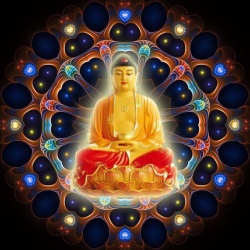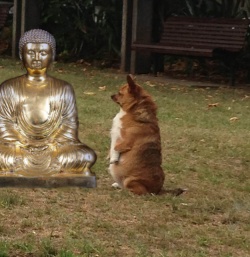Difference between revisions of "Sankhara-dukkha"
| (One intermediate revision by the same user not shown) | |||
| Line 1: | Line 1: | ||
| − | + | {{DisplayImages|2131|4250|2563}} | |
<poem> | <poem> | ||
The first is (in [[pali]] lannguage), [[Dukkha-Dukkha]] - which is just the run of the mill things we encounter in [[life]] which we find [[painful]] or dissatifying: [[sickness]], old-age, [[death]], loss of loved ones. These things generally bring the same "[[pain]] and [[sorrow]]" that we think of as "[[pain]] and [[sorrow]]" (and they write country songs about). | The first is (in [[pali]] lannguage), [[Dukkha-Dukkha]] - which is just the run of the mill things we encounter in [[life]] which we find [[painful]] or dissatifying: [[sickness]], old-age, [[death]], loss of loved ones. These things generally bring the same "[[pain]] and [[sorrow]]" that we think of as "[[pain]] and [[sorrow]]" (and they write country songs about). | ||
| Line 17: | Line 17: | ||
Second, most of the writings I am [[able]] to access, and I have in my library, reject two aspects of "[[suffering]]" (including [[Sankhara]]) that are often [[inherent]] in other schools of [[Buddhism]]: (1) that the [[suffering]] [[inherent]] in being a [[human being]] or other separate "[[conditioned phenomena]]" is so overwhelming and terrible that the goal of [[Buddhism]] is to escape from this [[life]] and get to a state of "[[extinction]]" leaving this [[world]] behind ... in contrast, [[Zen Buddhism]] tends to say that we will get to that "[[Wikipedia:Absolute (philosophy)|ultimate]] [[nirvana]]", but in the meantime we can know that [[samsara]] is just [[nirvana]], [[nirvana]] precisely [[samsara]], that is, have our cake and eat it too in this [[world]]; (2) the such terms as "[[life]] is [[suffering]]" are a gross misinterpretation of the meaning of the [[Buddha]] when he said such things as [[sabbe sankhara anicca]], [[sabbe sankhara dukkha]], [[sabbe dhamma anatta]] (sometimes rendered as something like: all is transciency, all is [[suffering]], all is unreal). | Second, most of the writings I am [[able]] to access, and I have in my library, reject two aspects of "[[suffering]]" (including [[Sankhara]]) that are often [[inherent]] in other schools of [[Buddhism]]: (1) that the [[suffering]] [[inherent]] in being a [[human being]] or other separate "[[conditioned phenomena]]" is so overwhelming and terrible that the goal of [[Buddhism]] is to escape from this [[life]] and get to a state of "[[extinction]]" leaving this [[world]] behind ... in contrast, [[Zen Buddhism]] tends to say that we will get to that "[[Wikipedia:Absolute (philosophy)|ultimate]] [[nirvana]]", but in the meantime we can know that [[samsara]] is just [[nirvana]], [[nirvana]] precisely [[samsara]], that is, have our cake and eat it too in this [[world]]; (2) the such terms as "[[life]] is [[suffering]]" are a gross misinterpretation of the meaning of the [[Buddha]] when he said such things as [[sabbe sankhara anicca]], [[sabbe sankhara dukkha]], [[sabbe dhamma anatta]] (sometimes rendered as something like: all is transciency, all is [[suffering]], all is unreal). | ||
| − | For example, the great late [[Buddhist]] [[translator]] [[Lama Govinda | + | For example, the great late [[Buddhist]] [[translator]] [[Lama Govinda]] wrote ( before he took off for "[[ultimate nirvana]]") that it probably should be read to say something like: "the way we {{Wiki|perceive}} the [[world]] is [[suffering]], which is [[inherent]] in all "separate [[existences]]" so long as they are [[perceived]] as such". See page 131 of his essay here: |
http://books.google.com/books?id=qUjpwK ... #PPA131,M1 | http://books.google.com/books?id=qUjpwK ... #PPA131,M1 | ||
Latest revision as of 04:10, 10 October 2014
The first is (in pali lannguage), Dukkha-Dukkha - which is just the run of the mill things we encounter in life which we find painful or dissatifying: sickness, old-age, death, loss of loved ones. These things generally bring the same "pain and sorrow" that we think of as "pain and sorrow" (and they write country songs about).
Viparinama-Dukkha means dissatisfaction due to change (you can see some overlap with the above), but most interestingly, including loss or fear of loss of an existing favourable or happy condition in life (when being attached to an existing pleasure or joy in your life, afraid to see it ever go). Thus, even happiness is a seed of Dukkha if we are insisting it be permanent.
Now the third category, and the one you ask about, is more subtle ... "existentlal" if you will. Sankhara-Dukkha, which can be rendered as the unsatisfactoriness and "suffering" experienced due to our conditioned state (i.e., a world in which we think there is a "world" and an "me which is separate from the world") (Notice again the degree of overlap with the first two categories). Now, lots of Buddhist philosophers have built all kinds of complicated systems analyzing this (you know, Buddhist philosophers tend to do what philosophers all over the world do ... analyze something to pieces and make all manner of "systems" about how ... in their fertile imaginations ... all the pieces fit together). A brief trip in the internet will give you a feel, for example ...
http://www.buddhamind.info/leftside/tea ... d-sank.htm
But the basic meaning is just that, in Jundo talk, apparently "separate stuff" is going to be bumping up against, and crashing into, and dissatisfied by, all the other apparently "separate stuff", plus "separate stuff" does things like seems to decay, die, fall apart. What is interesting is that these characteristics are pretty much inevitable, and unavoidable, so long as Skye, Jundo, table, rock etc. are seen as "conditioned phenomena" (i.e., separate stuff).
Okay, now to get to your question: What is the treatment in Zen Buddhism:
First, as you know, we do not tend to be much for Buddhist philosophies that cut the world into all manner of arcane "systems", and we tend to throw all such concepts into the furnace of "emptiness" and such and just burn them away. Problem solved by not treating the problem as a problem!
Second, most of the writings I am able to access, and I have in my library, reject two aspects of "suffering" (including Sankhara) that are often inherent in other schools of Buddhism: (1) that the suffering inherent in being a human being or other separate "conditioned phenomena" is so overwhelming and terrible that the goal of Buddhism is to escape from this life and get to a state of "extinction" leaving this world behind ... in contrast, Zen Buddhism tends to say that we will get to that "ultimate nirvana", but in the meantime we can know that samsara is just nirvana, nirvana precisely samsara, that is, have our cake and eat it too in this world; (2) the such terms as "life is suffering" are a gross misinterpretation of the meaning of the Buddha when he said such things as sabbe sankhara anicca, sabbe sankhara dukkha, sabbe dhamma anatta (sometimes rendered as something like: all is transciency, all is suffering, all is unreal).
For example, the great late Buddhist translator Lama Govinda wrote ( before he took off for "ultimate nirvana") that it probably should be read to say something like: "the way we perceive the world is suffering, which is inherent in all "separate existences" so long as they are perceived as such". See page 131 of his essay here:
http://books.google.com/books?id=qUjpwK ... #PPA131,M1
Jan Chozen Bays (of the Maezumi Lineage) and the Korean Son (Zen) Teacher Soeng Mu echo this here, giving the whole thing a more inner, psychological bent. Their basic point: "no where is it said in Buddhism (if accurately translated) that "life is suffering", but our mental perceptions cause us (by seeing a separate self, for example) to perceive that. The world, and the things in it, are not in themselves "suffering", but merely our way of relating to them and perceiving them. See from page 21 here:
http://books.google.com/books?id=WlBmFIyAJXUC&pg=PA21&lpg=PA21&dq=sankhara +dukkha+zen&source=web&ots=BIjpzfyC6T&sig=21Sodhxh zVnGqP6GIc5vqhnWIDY&hl=en&sa=X&oi=book_result&resn um=5&ct=result#PPA21,M1


